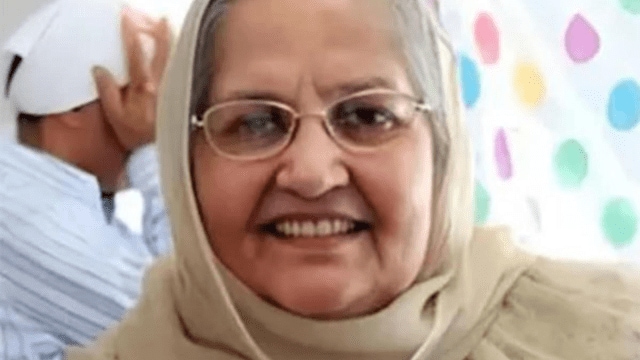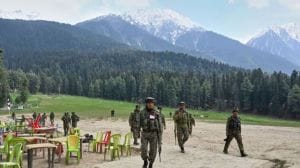‘Not even allowed to say goodbye to her family’: Punjabi grandmother deported from US after 34 years
Advocacy groups called the deportation of Harjit Kaur "inhumane," and said that "it is about the systemic cruelty inflicted on immigrant families".
 Harjit Kaur's lawyer claimed the journey back was marked by harsh treatment, including prolonged shackling, confinement in bare concrete cells, and denial of basic amenities. (File Photo)
Harjit Kaur's lawyer claimed the journey back was marked by harsh treatment, including prolonged shackling, confinement in bare concrete cells, and denial of basic amenities. (File Photo)Harjit Kaur reportedly reached the US in 1991 as a single mother, worked as a seamstress at an Indian saree store, paid taxes and volunteered at gurdwaras. In between, she applied for asylum but the bid was rejected.
Thirty-four years later, Harjit, now 73, was sent back — a return marked by prolonged shackling, confinement in bare concrete cells, and denial of basic amenities, according to her lawyer Deepak Ahluwalia. “She was not even allowed to say goodbye to her family or collect her belongings,” Ahluwalia said in an Instagram post, describing Kaur’s deportation as “inhumane”.
Kaur arrived at Indira Gandhi International Airport in Delhi on September 23, the lawyer said. In his social media post, Ahluwalia said Kaur was suddenly taken from Bakersfield to Los Angeles Sunday night, and put on a chartered flight by US Immigration and Customs Enforcement (ICE) to Georgia and from there to Armenia and then to New Delhi.
According to Ahluwalia’s post, Kaur’s family had arranged her travel documents, and requested that she be sent back on a commercial flight. “We had just two demands: first, to send her back on a commercial flight, and second, to let her meet her family for a few hours. But they refused to listen,” the lawyer said.
Kaur’s is the latest case to grab the headlines over the fresh wave of deportations initiated by the US this year.
Since President Donald Trump began his second term in January 2025, the US has deported at least 1,703 Indian nationals as of late July, according to the Ministry of External Affairs. Over 90 per cent of this year’s cases came from just five states: Punjab (620), Haryana (604), Gujarat (245), Uttar Pradesh (38), and Goa (26). A February 5 military flight carrying 104 shackled deportees to Amritsar drew sharp criticism over the inhumane treatment of deportees. It was followed by another such flight to Amritsar the same month.
BBC quoted Ahluwalia as saying that Kaur came to the US with her two minor sons after the death of her husband. It also quoted Kaur’s daughter-in-law Manjit Kaur as saying that Harjit, as a young widow, wanted to shield her sons from and escape the political turbulence in Punjab at the time.
The Sikh Coalition, the US-based rights body, has taken up Kaur’s case, calling her treatment at the hands of ICE “beyond unacceptable”, especially for an elderly widow managing high blood pressure and diabetes.
Kaur’s detention began on September 8, when she went for what she thought was a routine check-in at the San Francisco ICE office. Instead, she was arrested, transferred between detention facilities in Fresno and Bakersfield, and held for two weeks without consistent access to her prescribed medication, family members said.
According to Kaur’s lawyer, her asylum bid was rejected and a removal order issued in 2005. Her final asylum plea was rejected in 2012, days, Ahluwalia said. Still, he said, for more than 13 years, she complied with ICE protocols, attending check-ins and renewing work permits every year while awaiting delayed travel documents from the Indian consulate.
The “sudden” detention, despite her long-standing ties and clean record, sparked protests in California. Hundreds rallied in El Sobrante, carrying signs that read “Hands off our grandma” and “Harjit Kaur belongs here.” Congressman John Garamendi, California Senator Jesse Arreguin, and local leaders had urged ICE to reconsider, calling her detention a “misplaced priority”.
ICE defended the action, telling the BBC, “Kaur has filed multiple appeals all the way up to the Ninth Circuit Court of Appeals and LOST each time. Now that she has exhausted all legal remedies, ICE is enforcing US law and the orders by the judge; she will not waste any more US tax dollars.”
But rights groups argue her case highlights the human cost of stepped-up deportations under the Trump administration.
In a blog post, The Sikh Coalition vowed to keep pressing for accountability. “This deportation is not just about one grandmother,” the group said in a statement. “It is about the systemic cruelty inflicted on immigrant families who have lived, worked, and served their communities in America for decades,” it said.







